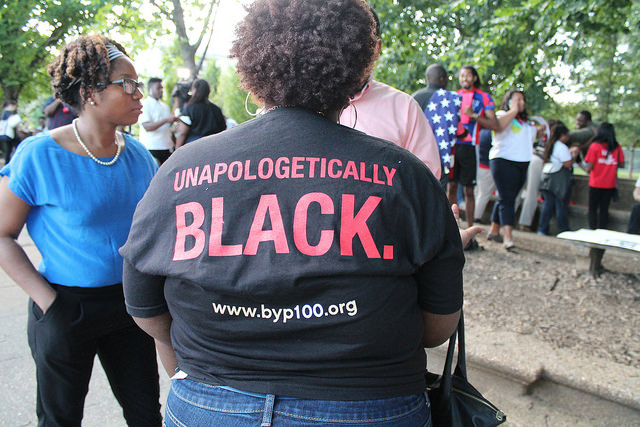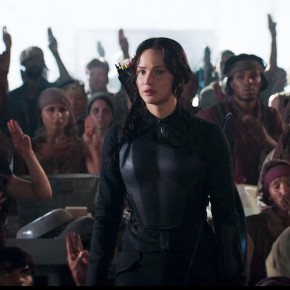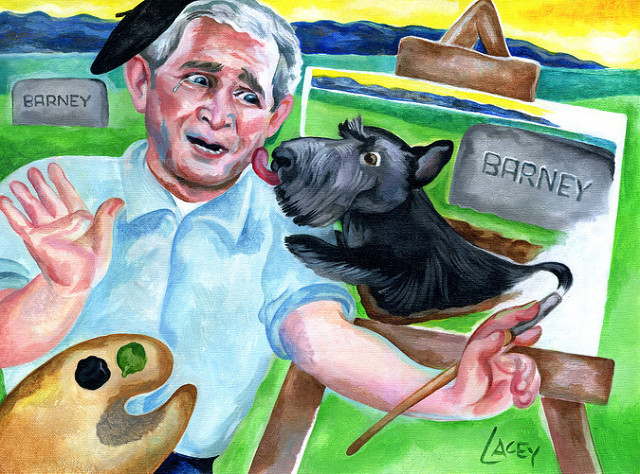The results of the grand jury proceeding in the shooting of Michael Brown are hardly a surprise. Indeed, the jurors’ failure to return a bill of indictment was a foregone conclusion. The number of times that law enforcement personnel have been brought to book in this country for an act of violence committed against a person of color can probably be counted on one hand.
Prior justification of violence in the project of securing the fundaments of America’s social order is inscribed in the institutions of the system itself. The case of Michael Brown is a perfect illustration of the ways that the systemic attribution of criminality to young men of color creates opportunities for the policing of bodies seemingly detached from traditional modes of racism (exemplified by figures such as Mark Fuhrman) by being distanced from the personal inclinations of the perpetrators.
The mainstream media did its level best to make it appear as if the outcome of the proceeding was anything but a certainty. The suspicion that the fix is in detracts from the entertainment value, and the American public likes nothing better than to see a race fairly and impartially run, especially when the outcome reaffirms the moral benevolence of the institutional order. But although the result was never in doubt, the exercise itself was a necessary component of the spectacular reproduction of institutions.
It was necessary that the system be seen to function “impartially” in order to blunt the rhetorical force of any potential critical counter-narrative. And, in truth, the system did function impartially, at least in a certain formal sense. It wasn’t as if it was a matter of Boss Hogg calling down to the courthouse to personally dictate the verdict. Rather, the bureaucracy functioned as it was meant to do, each individual representative working (à la Max Weber) sine ira et studio to generate a formally valid result.
That this is the case is a perfect illustration of the insidious nature of the policing of race in the capitalist mass polity of the modern west. The election of Barack Obama as president of the United States was, in the liberal and progressive worldview, meant to be the harbinger of a new, post-racial America.
Conservatives, at least, understood that this was a fiction and that the politics of racial competition and racial policing remained very much in play. Barack Obama’s election meant one thing, and one thing only: that a candidate would not be eliminated from consideration for the job of chairman of the board of the American neoliberal enterprise simply on the grounds of race.
To the bitter disappointment of many (particularly leftish) segments of the democratic electorate, Obama quickly dispensed with the rhetoric of hope and began plowing a political furrow just to the right of Ronald Reagan. His status as the first African American president notwithstanding, the Obama Administration has been just as bad, and in many respects worse than that of his predecessor. On the one hand, Obama has managed to prevent the lunatic fringe of the opposing party from sparking a catastrophic deflation via its obsession with deficits and securing of the perquisites of creditors. On the other hand, his commitment to drone warfare has left a trail of broken bodies across the Middle East, of which the Islamic State and the Pakistani Taliban (among others) have taken full advantage.

Perhaps the clearest illustration of the vanity of the talk of post-racial America was the case of Henry Louis Gates. The rousting of an African American Harvard professor out his own home by white police in Cambridge (a situation clearly unthinkable in a case where the homeowner was white) was a jarring reminder of the ways that race is inscribed in the carceral and surveillance institutions of the United States. Even a black man who has notionally demonstrated his bona fides (by participation in bourgeois scholarly institutions, the acquisition of property, etc.) is still liable to be perp walked out of his own home irrespective of any gestures of earnest toward the settled order of society on his part.
And, of course, this is not an isolated case, as the public frisking of Forrest Whitaker in a New York deli, and a thousand other such incidents, clearly show. Obama’s attempt to defuse the situation by inviting Gates and the arresting officer to discuss the matter over beers in the White House rose garden merely highlighted the degree to which the supposedly post-racial Obama Administration was complicit in the maintenance of the fiction that the discriminatory policing of blacks was an unintended consequence of functioning, egalitarian political institutions.
While the representatives of the ruling order strive to create narratives of formal equality, events on the ground trace the actual contours of the racial landscape. The case of Trayvon Martin showed that it was legitimate for a white person to instigate a conflict with a person of color and then kill them when they responded. The fact that Marissa Alexander, a black woman who fired a warning shot frighten at her abusive husband, was compelled to take a plea deal in order to avoid a 20 year jail sentence in a case in which no one was injured, is instructive. White people are justified in standing their ground; black people less so.
The underlying point is that black people are inherently threatening, even to other blacks, but especially to white people. It took the judicial system two bites at the apple to convict Michael Dunn of murder for firing a gun into an SUV full of black teenagers, whose loud music apparently frightened (but more likely simply annoyed) him. At his first trial, he was convicted of the attempted murder of two of the young men in the SUV, but not of murdering Jordan Davis (who was actually killed) because jurors managed to convince themselves that Dunn feared that Davis was armed. For the white man discomfited by the ‘criminal’ element of young black men playing loud music, even the suspicion of danger is, at least for many, grounds for the application of lethal violence.
Rudi Giuliani’s claim on a recent edition of Meet the Press that the underlying problem was black people killing each other was particularly illuminating. It wasn’t that he was not racist, but simply that he was not particularly racist. The inscription of race and the economic and carceral institutions of the state allow him to maintain the fiction (however threadbare) that he is simply responding to an “objective” condition (93% of black homicide victims are killed by other blacks according to him). The problem is not only that of the racist tropes firmly embedded in Giuliani’s comments, but also that the systemic construction of young black men as intrinsically violent, animalistic, in need of discipline and control functions in and of itself to produce this repressive knowledge.
The problem of race in western states resides in the institutions of society itself, rather than solely or primarily in terms of personal inclination. Clearly there are plenty of overt and unapologetic racists in the United States and Europe today. It is also probably fair to say that they are statistically overrepresented among the forces of order. But the fact that they so readily find a home in such institutions is an expression of the continuing inscription of racial narratives in the structures of the institutions themselves, and in those of society more generally.
The effects of these narratives then synergize with other social imperatives to produce the patterns of racial violence and policing that we see in American and European societies today. Once again, it is not merely a matter of personal inclination. The shooting dead of Akai Gurley in the stairwell of a Brooklyn housing project by a non-white probationary police officer makes this clear.

It’s not simply a matter of, to quote N.W.A., “black police showing up for the white cop” (the officer in question was of Asian decent but the point here is his non-whiteness,) but rather that the narratives of race are so thoroughly imbricated in the institutional structures of domination that the substitution of non-white for whites among police personnel (as demanded by many of the protestors in Ferguson) doesn’t really address the root of the problem.
Since the killing of Michael Brown, the relentless progression of black men killed by authority figures has continued unabated. At the same time, there is a peculiar dynamic of “consciousness raising” among people on the left who might have been expected to know better. The violent policing of black bodies has been a fundamental element of the political-economic order of the west for 350 years. It did not begin with Michael Brown. Consciousness is preferable to false consciousness, so long, at least, as it endures. But this increased sensitivity to one important issue seemed at points to raise the prospect of critique as a zero sum game.
This was particularly in evidence in the debates surrounding the (extremely problematic) “catcalling” video, in which some who sought quite rightly to disentangle the issue from the dynamics of policing black bodies seemed to give the impression that the latter was trumps. In fact, the construction of women as objects of male edification, and the construction of black males uncivilized animals are two elements of the larger process of policing of bodies for the maintenance of social order; they are heavily imbricated in (but not reducible to) neoliberal capitalism.
The transformation from neoliberal capitalism to some post-capitalist mode of production will not in and of itself resolve or eliminate the role of either the patriarchy, or of racial prejudice and domination, in human society. But neither can these topics be adequately addressed without pursuing their roots in a socio-political order that is fundamentally ties up with capitalism.
The immediate upshot of all of this is that Darren Wilson will never have to answer in open court for his actions, never have to fill in the gaps in a story that is, on its face, implausible. Conducting the trial in the context of a grand jury functioned to insulate the prosecutor, for whom his continuing good relations with the police are practically much more important the life of a young black man, from the prospect of having to impugn Darren Wilson’s story in open court.
Clearly, the event was staged to create a sort of legitimacy of process. That’s all it was. If you hang around prosecutors, you will occasionally hear them (more or less jokingly) say that it is possible to get a grand jury to indict a ham sandwich. And why not? The prosecutor is under no obligation whatsoever to provide anything by way of exculpatory evidence.
The fact that this one decided to stage the trial at the grand jury phase tells us much of what we need to know about his this case played out. In the larger sense, it is simply one more moment in the long history of racial domination written into the political order of this society at the level of its pores. If things are going to change, this is the level at which it must happen.
Photographs courtesy of Elvert Barnes, Steve Rhodes, and Billie Ward. Published under a Creative Commons license.





